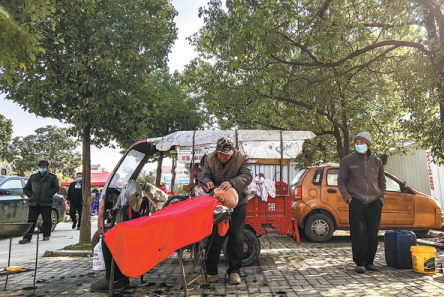Salons leave old-style barbers on the street
Traditional operators take up posts on pavements to offer cheaper, convenient haircuts. Li Hongyang reports.
By Li Hongyang | CHINA DAILY | Updated: 2021-03-01 09:10

A bitter life
Li, a 50-something barber who would only give her surname, said her life is tough.
As footfall is plentiful on the streets near the Beijing Anzhen Hospital in Chaoyang district, she conducts her business at the roadside.
The wind blows the cuttings onto the ground and Li is often too busy to clean up immediately.
A street sweeper responsible for the road walks past her often, but he usually ignores his duty as he is confident that the freelance barber he sees every day will eventually get around to doing the job.
However, the local street inspectors refuse to ignore the problem, and they often tell Li and two other barbers who work nearby to leave the area.
Li used to work as a saleswoman at a clothing store in a shopping mall. However, constantly lifting boxes left her with periarthritis, or "frozen shoulder", a condition that limits arm movement, meaning she was no longer able to work regular hours. Instead, she turned to on-street hairdressing, a skill she learned in her youth.
"It's hard work to lift up my arms while trimming customers' hair, but I have no choice. Life is hard for people at my age," she said.
Mature infrastructure
Unlike Xing's attempts to found a business empire in the 1990s, Ye Wangeng, who runs 150 chain salons nationwide, has found it easy to expand as China's small-business infrastructure is now more mature.
He said it was inevitable that such salons would replace all the mom-and-pop shops because their staff members regularly receive training so they can cater to customers who demand the latest styles.
The 41-year-old has stores in Shanghai, Tianjin, the Xinjiang Uygur autonomous region and the provinces of Zhejiang, Anhui and Jiangsu. He employs more than 3,000 people.
"A hairdresser who doesn't keep learning can't survive in the industry. Some street hairdressers never had the ambition to learn or improve," he said.
In 2000, after five years as an apprentice, Ye rented some premises and started his own hair salon. A year later, he opened his second outlet and his career took off as his salons spread across East China.
"Only by opening more salons could I guarantee a sustainable business. If I just rented one salon, I would never be secure because the landlord might suddenly terminate the lease," he said.
























